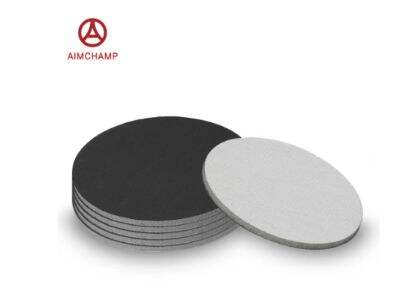Woodworking is neat, it's where you make all sorts of nice things from wood. Not that it is not a pain in the ass. The finish of woodworking projects is often one of the most painstaking and tiring parts. The point of a rustic brush off is it will make the wood looks better and add some texture to an otherwise plain board. So instead of resizing the dimensions on our own. But what if I told you there´s a simpler way to do it? This is where sandpaper comes in! Aimchamp is here to help you.

What is Sandpaper?
Sandpaper and Scouring Pad is just extremely rough paper which small particles of hard materials (called abrasive pieces) adhere to. It is those little particles that scratch up the face of your wood project as you sand it with this grit and making at least some rough areas smoother. Featuring your project in this way will give it a more polished look!
Understanding Grit
Sandpaper is graded by grit, on a scale of fine to coarse. Grit — This is a figure to tell the coarse or fine of sandpaper and Sanding Disc. The lower the grip higher it removes a lot of wood quicklyIn other words 60 grit number shows rigid and material removing sandpaper. However, if it is the higher number then we have a much finer sandpaper that can be used for final finesse work. It is a more smooth and finish from higher grit number of sandpaper you use on your wood.
Great for Curved Surfaces
It is great for creating curves in sanding. From time to time when you are creating a project, it may necessitate circular or curved components. It may involve quite a bit of being sawing and other tool wielding, but the above steps should get you there… A steel punch can only make straight lines – never graduating curves -see how lovely and gentle are those acetate bends now?
Next we will start with a lower grit sandpaper and if you are smoothing out one of the curved faces. It should help smooth any elevation differences from bells and pulling up previous finish. Once you have rounded the curve a bit, step up to higher grit sandpaper. It will allow you to have an ultra-smooth surface, Yes this is going to take a long time, but it will worth the result.
Saves Time and Effort
If you have ever sanded a large piece of timber by hand in the past?! It is exhausting and so time sapping! However, sandpaper is a quick fix for when you just want to avoid the work of starting on your new wood project quickly Think about how much sanding four or five minutes of hand-sanding uses and covers compared to a quick regular pass with some sandpaper.
You may also choose to use a power sander with sandpaper and Sanding Belt for efficiency. Why are power sanders so different in that they simply make the paper vibrate back and forth/ across the surface of wood, rather than rotate? It batters than you did it manually. If you need to do quite a bit of sanding, investing in a power sander can be smart for some hands-on help with your work over time.
Helps with Glue and Staining
You do get a nice side effect in the process, too — wood sanding makes surfaces hold glue better and stain goes on more even. By sanding the wood, you are essentially creating a potted and porous surface. This means glue and other adherents have an easier time sticking to the wood.
And, it smoothes out blemishes and defects in the wood. This way the stain can do i a more even coat with less strenueous work. As a result, if you will be staining your wood project, the first step is to sand it. In this way, your project will achieve the most optimal results and you will be very satisfied with its appearance!
Various Grits for the Needs
There are also a variety of grits available depending on the project that needs to be done with sanding paper itself. High Grit Number — You would pick sand papers with a high grit number if you want your project to look extra smooth. But, if smoothness is not so much of concern go with sandpaper at a lower grit. Sanding, too is a woodworking activity that serves many purposes such as stripping old finishes, shaping curves and creating texture. Then sanding paper will be a must-have thing that you do not want to run out, but frankly for the most of woodworking workshops it is one.
How to Use Sandpaper
At the end of all this, sandpaper is essential for speeding up challenging and tedious work. To put it another way, you are crazy if you have a project that works with wood materials (which can be absolutely beautiful.

 EN
EN
 AR
AR BG
BG HR
HR CS
CS DA
DA NL
NL FI
FI FR
FR DE
DE EL
EL HI
HI IT
IT JA
JA KO
KO NO
NO PL
PL PT
PT RO
RO RU
RU ES
ES SV
SV TL
TL IW
IW ID
ID SR
SR ET
ET MT
MT TH
TH TR
TR FA
FA AF
AF MS
MS GA
GA CY
CY MK
MK EU
EU KA
KA LA
LA NE
NE